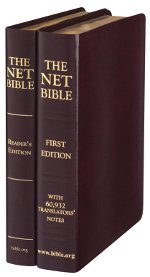"The NET Bible (New English Translation) is a completely new translation of the Bible with 60,932 translators’ notes! It was completed by more than 25 scholars – experts in the original biblical languages – who worked directly from the best currently available Hebrew, Aramaic, and Greek texts. Turn the pages and see the breadth of the translators’ notes, documenting their decisions and choices as they worked."
"The translators’ notes make the original languages far more accessible, allowing you to look over the translator’s shoulder at the very process of translation. This level of documentation is a first for a Bible translation, making transparent the textual basis and the rationale for key renderings (including major interpretive options and alternative translations)."
"This unparalleled level of detail helps connect people to the Bible in the original languages in a way never before possible without years of study of Hebrew, Aramaic, and Greek. It unlocks the riches of the Bible’s truth from entirely new perspectives."
According to Brian H. Edwards in his book, From Vulgate to Vulgar, "It is constantly updated from input by scholars and others on the latest research results in linguistics and interpretation. The notes are intended both at a technical level for pastors, teachers and students of Hebrew, Aramaic, and Greek who are interested in the grammatical, syntactical and text-critical details, and for general readers."
"The NET Bible aims to be ‘accurate, readable, and elegant’ and strives for ‘faithfulness to the original biblical texts while at the same time seeking to attain accuracy in terms of current English style'. One of its general principles is to indicate in the notes a more literal rendering, and to be gender-accurate rather than gender-inclusive."
As with any translation, it is not without its flaws. One thing I do not like about it is that it uses the expression "bad luck" in Ecclesiastes 5:14, where it says, "Then that wealth was lost through bad luck; although he fathered a son, he has nothing left to give him." They have translated the Hebrew word "inyan" as luck, but luck is not taught in the Bible at all. In fact, luck is connected with lucifer, which you can easily verify if you do some research. I find that many believers are accustomed to using the term luck, even though it is unbiblical. I prefer instead the way the NIV translates this verse with the expression, "some misfortune", or even the NASB that translates it as "bad investment." I have not read the entire NET Bible, but this was just one point on which I disagree with the translation, and I want to be clear that I do not promote the use of the term "luck." Nevertheless, the translation gives the alternate English words for "inyan" in the notes, so this helps to address the issue I have with it.
Therefore, I still recommend it overall. Let me encourage you to investigate this new translation, which is available at the following sites:
http://netbible.org
https://lumina.bible.org/bible/
http://netbible.com
Author's note: If you enjoyed this post, you may also like the other posts in this blog available through the Home page, such as The Bible is the Word of God, Read the Bible for All Its Worth!, All Scripture must be fulfilled, The Uniqueness of God's Word, The Bible Never Fails, and Bible Reading Plan. You may also access my complete blog directory at "Writing for the Master."
_________________________________________________
Len Lacroix is the founder of Doulos Missions International. He was based in Eastern Europe for four years, making disciples, as well as helping leaders to be more effective at making disciples who multiply, developing leaders who multiply, with the ultimate goal of planting churches that multiply. His ministry is now based in the United States with the same goal of helping fulfill the Great Commission. www.dmiworld.org.
